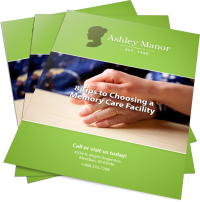Although it’s possible for someone with Alzheimer’s to continue living in a residential home, it takes some problem-solving and creativity to ensure safety. As the disease progresses, a person’s abilities transform. Moreover, symptoms vary from person to person. Here are some tips for how to protect your home when you’re caring for someone with Alzheimer’s.
Slips and falls
Falls are the number one unintentional safety hazard for elderly people in general. Those with Alzheimer’s are at an even greater risk due to their decreased ability to accurately judge space and distance. To reduce the likelihood of your loved one having a slip or fall, remove hazards, such as coffee tables, rugs, magazine racks, lamps and low bookshelves. Use night lights throughout the house to reduce disorientation and place extra lights in hallways or dimly lit areas.
Weapons
Having a weapon accessible increases the chances of serious harm. People with Alzheimer’s or other dementia-related illnesses have less ability to safely maneuver guns and knives. Some people with dementia become increasingly aggressive and are unable to differentiate between friends, family and strangers. Such a mistake may cause them to harm a loved one that they consider an intruder. Disable weapons that are accessible to the person with Alzheimer’s. Lock up any guns or knives, or remove them from the home entirely.
Medications
People with dementia are apt to make mistakes when it comes to dispensing medication, including forgetting to take medicine or taking the wrong dose. As a caregiver, your role in a person’s health care increases substantially. Keep all medication in a locked cabinet or drawer. Ensure that all medications have a child proof cap and are labeled clearly, preferably with large letters.
Scams
Many elderly people become targets of financial exploitation, home repair scams, phone fraud, car theft, and burglary. People with Alzheimer’s are especially vulnerable to such crime and scams. To minimize a person’s risk, register their name with the Direct Marketing Association and place a “No Solicitation” sign outside of the house. Place your number on the “Do Not Call” list at 1.888.382.1222. Call the Consumer Credit and Reporting Industry at 1.888.567.8688 to remove a person’s name from the credit bureau’s mailing list.
Getting lost
Many people with dementia end up wandering outside of the house and becoming lost. Statistics indicate that if a person is not found within the first 24 hours, there is a 50 percent likelihood he will end up hurt or possibly dead. Purchase an identification bracelet or necklace for your loved one to wear that indicates his name, your phone number, and any pertinent health conditions. Place dead bolts and door locks out of reach of the person with Alzheimer’s. Inquire with the Alzheimer’s Association at 1.800.272.3900 about the MedicAlert + Safe + Return program and to learn of other safety tips regarding wandering behavior.
When issues arise that indicate a loved one needs more supervision or care, please contact resources that are available for support. There are many sources of information for caregivers that help people with Alzheimer’s or other dementia-related illnesses.



Leave a Reply